Sprouted grains for chickens with 17 types tested
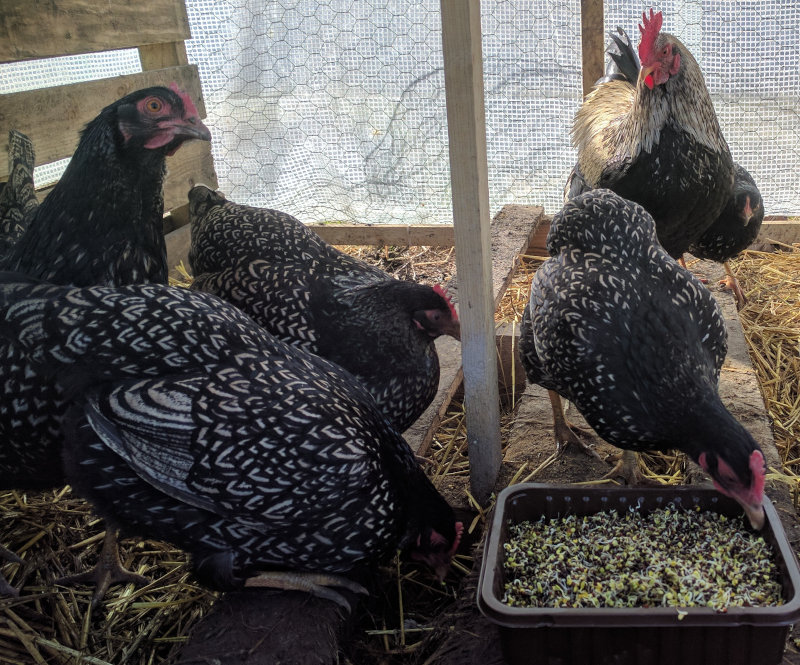
I have sprouted and tested 17 types of sprouted grains on my chickens, here's what I have found.
Table of Contents
- What is sprouted grains for chickens?
- Can you feed chickens sprouted seeds?
- Can all grains and seeds be sprouted for chickens?
- Are sprouts good for chickens?
- What happens when you sprout grains for chickens?
- Disadvantages of sprouted grains for chickens:
- What is the best sprouted grains for chickens?
- Sprouts for chickens price comparison:
- What sprouts can chickens eat?
- What sprouts can chickens not eat?
- How to sprout seeds for chickens:
- Should you let sprouts green up before feeding?
- How to feed sprouts to chickens:
- Can you feed chickens just sprouts?
- Can baby chicks eat sprouted grains?
What is sprouted grains for chickens?
Sprouted grains for chickens come from the germination of seeds in water, to produce a green shoot with very young leaves. Sprouting is a quick, simple and inexpensive process which can be done without sophisticated equipment.
Below: My hens eating canola or rapeseed sprouts.
Sprouting grains for chickens changed the nutrient profile of the grains for the better, has a quick production cycle, occupies very little space and provides high yields of easily digestible food for your flock.
Can you feed chickens sprouted seeds?
You can feed sprouted grains to chickens. Sprouting seeds to feed to chickens is an excellent way adding diversity to the diet and increasing the nutritional value of your chicken scratch. When you sprout seeds they become much more digestible and the whole nutrient profile changes for the better.
Sprouts for chickens also enable you to feed seeds that chickens would not normally be allowed to eat raw, like barley, lentils, beans and pulses.
Below: Sprouting seeds for poultry feed is something that has been done for hundreds of years. This is from a 100 year old poultry book.
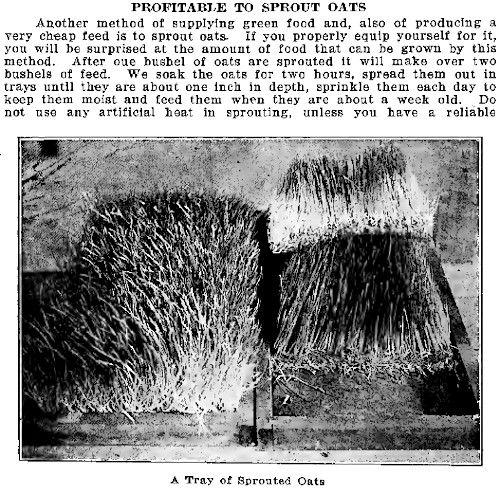
Can all grains and seeds be sprouted for chickens?
Any sprouts are suitable for humans are fine for chickens and any grains chickens would normally eat can be sprouted.
Some commercial varieties of wheat, barley and oats have been treated before packing and will not sprout. This is to prevent farmers keeping buying cheap seeds to sow the following year but it is also a pain for backyard keepers who sprout.
Flax does not sprout well as it turns into a slimy mess.
Use forage oats not feed oats as feed oats have had some kind of heat treatment and will go mouldy instead of sprouting.
Some animal feed-stuffs are treated so make sure you buy plain untreated seeds for sprouting.
Pseudo-cereals such as quinoa, amaranth, and buckwheat are also considered whole grains.
Are sprouts good for chickens?
Sprouted grains are a good feed for chickens. The nutritional content in sprouted seeds varies according to variety and growing location. Two different types of wheat can have vastly different nutritional properties.
Hard red winter wheat has a higher protein content than standard wheat varieties but is a little more expensive to buy.
As the seed begins to germinate, the seed coating begins to break down. This makes the seed more easily digestible.
As a general rule, sprouts contain significant amounts of vitamin C, B complex and K as well as protein and fibre and small amounts of fats. Minerals include small amounts of calcium, iron, magnesium, phosphorus, potassium and zinc.
The one thing that makes sprouts a good food for chickens is they are more easily digestible than dormant seeds so the nutrients are easier to get to and the start of the growing cycle uses up the sugars and starches giving you a relatively higher level of protein per calorie.
The effect of germination on the fibre content of sprouted grains is inconsistent and depends on fibre fraction of the original grain, germination time and the season.
During germination, the stored proteins are hydrolysed into peptides and amino acids by enzymes during the first 2 to 3 days, increasing protein bio-availability by up to 30%.
Vitamin C content in grains is generally very low but studies have reported higher vitamin C levels in germinated grains.
What happens when you sprout grains for chickens?
Sprouts have many benefits as they supply food in what is essentially a predigested form. As the grains begin to grow they are acted upon by enzymes and this makes them much easier to digest.
The grain swells as it absorbs water, the seed case splits and a root and leaf begin to appear.
- The grains digestibility increases.
- Energy content, carbohydrate and sugar content decreases by around 15%.
- Protein availability increases by at least 30%.
- Mineral availability increases by 15%.
- Vitamin levels increase by between 25% and 200%
During sprouting, much of the starch is broken down into simple sugars such as glucose and sucrose by the action of amylase and proteins are converted into amino acids and amides. Fats and oils are converted into more simple fatty acids by the action of the enzyme lipase.
Disadvantages of sprouted grains for chickens:
It's not all sweetness and light, there are a few downsides to sprouting grains for chickens.
- Sprouts are a fresh product with a short shelf life that does not store for long.
- Sprouts can become contaminated with mycotoxin, produced when mould grows.
- Bacterial contamination is common in in sprouts older than 4 to 6 days.
- Producing sprouts is more time consuming as it takes 4 to 8 days to be ready.
You can get around the problems by producing small amounts on a regular basis and only feeding fresh.
What is the best sprouted grains for chickens?
My chickens verdict was: They ate all the sprouts of whatever type I fed to them as soon as they got them. This makes the choice of which grains you should choose for sprouting a little easier.
My list of the best grains to sprout for chickens:
- Wheat.
- Sorghum / Dari.
- Canola / rapeseed.
- Peas.
- Safflower.
- Mung bean
My list is based on which grains were the cheapest and easiest to sprout.
Choose the cheapest option for you or the most freely available unless you specifically want to add something to the chickens diet.
Sprouts for chickens price comparison:
The relative cost to me of a 25kg sack of the grains I used to sprout for my chickens.
| Grain | Cost per 25kg |
| Wheat | £8.10 or $11.50 |
| Oats | £7.25 or $11.00 |
| Barley | £5.50 or $7.70 |
| Sunflower seeds | £28.00 or $40.00 |
| Safflower seeds | £16.00 or $22.50 |
| Corn or Maize | £9.50 or $13.50 |
| Rye | £21.00 or $30.00 |
| Alfalfa | £225.00 or $315 |
| Peas | £12.00 or $17.00 |
| Canola / Rapeseed | £11.00 or $15.50 |
| Buckwheat | £14.50 or $20.50 |
| Red clover | £175.00 or $246.00 |
| Lentils | £66.00 or $93.00 |
| Sorghum / Dari | £10.50 or $15.00 |
| Birdseed / canary seed | £34.00 or $48.00 |
| Mung beans | £33.00 or $46.00 |
| Rice | £75.00 or $105.00 |
| Millet | £16.00 or $22.50 |
| Quinoa / Amaranth | £80.00 or $112.00 |
| Hemp | £36.00 or $51.00 |
What you pay will vary depending on what crops are grown locally.
What sprouts can chickens eat?
Any grain or seed that can be fed to chickens in it's dry unsprouted form can be easily sprouted to feed to chickens. Several grains like dried peas, barley and lentils that can not be eaten in the raw unprocessed form can be safely sprouted and fed to chickens.
The actual nutritional levels vary depending on the variety and the growing location.
Here is a complete list of sprouts that can be fed to chickens:
Wheat: Probably one of the most common sprouts keepers feed to chickens is wheat. Sprouted wheat contains around 7.5% Protein, B Complex, C, E and trace minerals; Calcium, Iron, Magnesium, Phosphorus.
Below: Wheat sprouts.
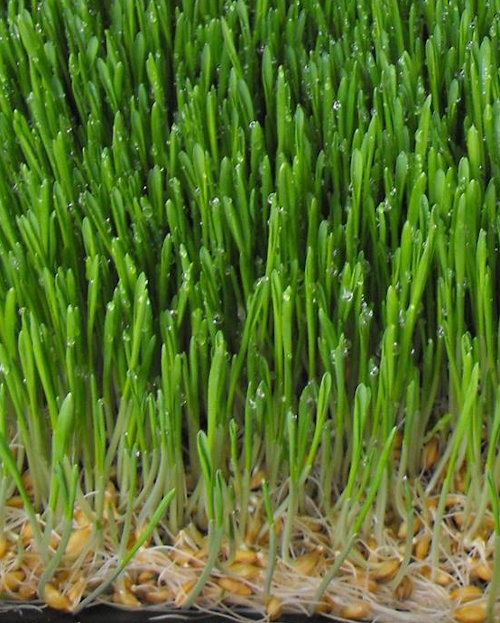
Wheat is the most widely grown crop of them all and easily available. It is good for sprouting for chickens and can be greened up for fodder as well.
My chickens verdict on wheat sprouts was positive, the ate them all at once with no waiting.
Oats: Oats are cheap, sprout quickly and don't need light to spout. Sprouted oats are very good for bringing hens into lay I fed them all winter long to my birds.
I greened them up a little so as the chickens had access to fresh greens in their diet all winter.
Barley: Whole grain barley is not a good food for chickens as it contain anti-nutrients but once sprouted it becomes much more digestible. Wholegrain barley is particularly high in lectins which are not good for the digestive system of chickens but sprouting barley breaks down these complex proteins.
Below: Sprouted barley grains.
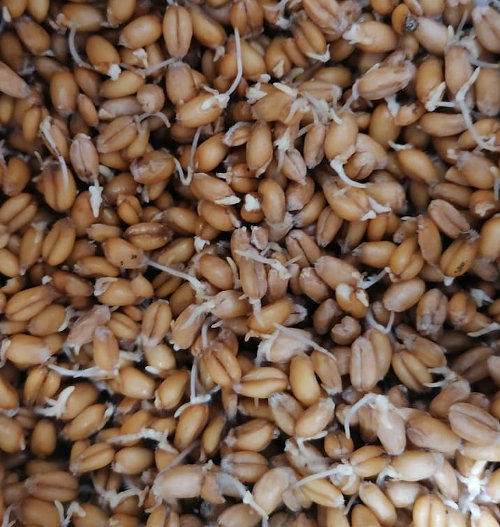
Barley can also be greened up and fed as fodder to chickens.
Sunflower: Sunflower sprouts contain 12% protein, B Complex, Vitamin E and trace minerals; Calcium, Iron, Phosphorus, Potassium, Magnesium.
You should not green sunflower seeds before feeding.
Safflower: Sprouted safflower seeds have become a favourite for me and my hens.
Safflower is a sturdy plant that looks a bit like a thistle and has a long tap root enabling it to reach water and nutrients up to 2 metres below the surface and has been a crop since Egyptian times.
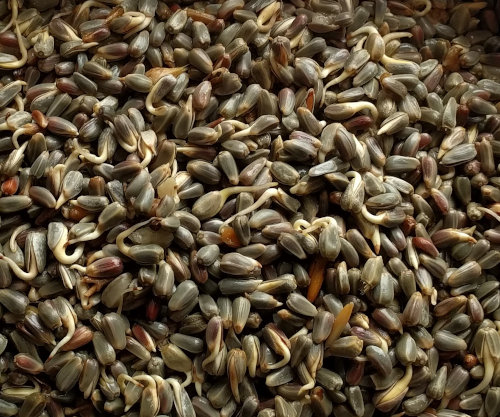
Corn and maize: Corn and maize is sometimes grown as a fodder crop and it can be greened up and fed to chickens in this state as well. I found it was best to buy the small kernel "French Maize" as the standard varieties were sometimes to large for chickens to eat easily. More on feeding corn to chickens.
Rye: Although rye can be easily sprouted like any other grain and fed to chickens it does harbour a fungus called Ergot which produces a toxin which is hallucinogenic in humans but fatal in chickens. Although rare I would avoid Rye and I haven't tested it.
Alfalfa: Alfalfa has 4% protein, Vitamins A, B, C, E, K and trace minerals; Calcium,Magnesium, Potassium, Iron, Zinc and as much Carotene as carrots.
Peas: Peas have between 8% and 20% protein as well as Vitamin A, B complex and C. They are also rich in calcium. More on feeding peas to chickens.
Canola or Rapeseed: Canola or Rapeseed is a member of the brassica family and the seed is used most commonly in oil production. The left overs, called meal or cake , from the oil pressing often finds it's way into animal feeds as a protein.
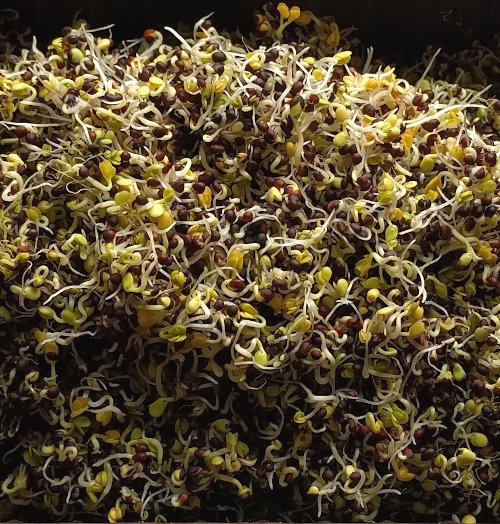
Buckwheat: Buckwheat should not be greened after sprouting as they are a member of the Rhubarb family and the green leaves contain oxalic acid.
Below: Buckwheat sprouts ready for chickens.
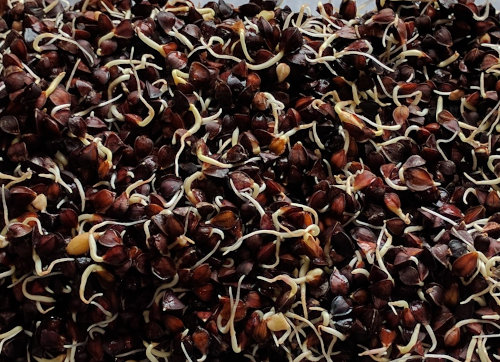
Buckwheat has one of the greatest amounts of bio available protein from sprouts. Buckwheat contains at least 12% protein along with Vitamin A, C, E and trace amounts of Calcium and Iron.
Red clover: Red clover to sprout for chickens is expensive. I paid nearly £7 or $9 for 500 grams making it almost 50 times the price of wheat, barley and oats.
Red clover seeds are tiny and produce a leafy sprout meaning they are not a good choice for chickens.
Lentils: Lentil sprouts have 9% protein, Vitamins A, B - complex, C and E as well as Iron, Calcium and Phosphorus.
Below: Lentil sprouts.
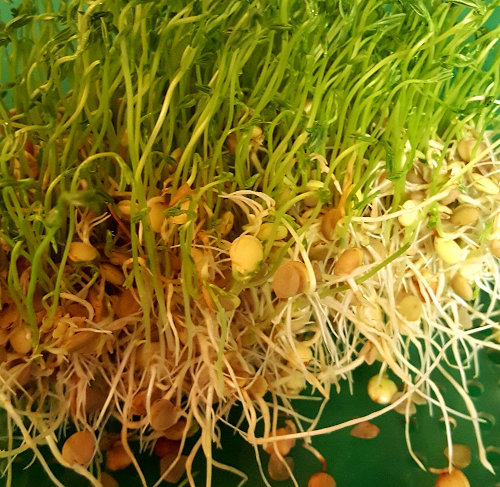
Lentils should never be fed raw to chickens but sprouted make a nutritional addition to the diet.
Sorghum or Dari: A member of the grass family that produces a wide variety of seed sizes and colours from red through to yellow. All members of the family are suitable for sprouting and in some parts of the world it makes up the bulk of poultry feed.
Below: Sprouted Sorghum or Dari fast became a favourite for me and the hens. Easy to sprout.
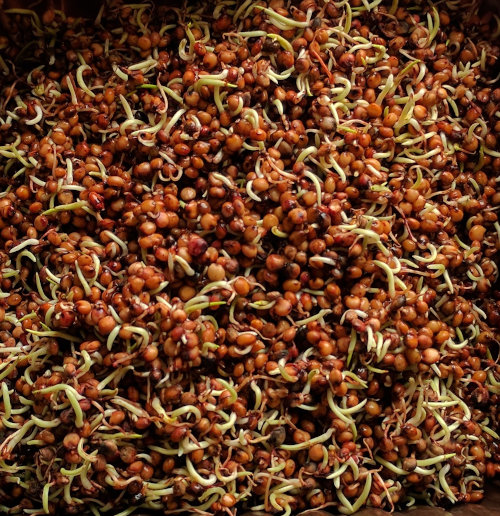
I get red Dari quite easily and cheaply here in the UK and it sprouts quickly and is ready to feed in 3 to 5 days. It can also be grown on a little to provide winter or extra greens for chickens. Being a small grain, sorghum is suitable for bantams, Serama and baby chicks.
Sorghum or Dari requires warmer sprouting conditions than some of the more traditional grains.
Bird seed or canary seed: These are the product of a wild grass and can be sprouted easily to feed to chickens and poultry.
They are more expensive and no more nutritious than some of the cheaper grains and seeds. Some may have been treated to prevent it from sprouting and none of the attempts we made with store bought canary seeds produced any usable sprouts.
Beans: Mung beans is the classic bean-sprout for chickens. Raw beans are toxic but fully sprouted bean-sprouts are fine for chickens, raw or cooked.
Below: My mung beans sprouts for my hens. The 25KG sack was £33 making them an expensive choice.
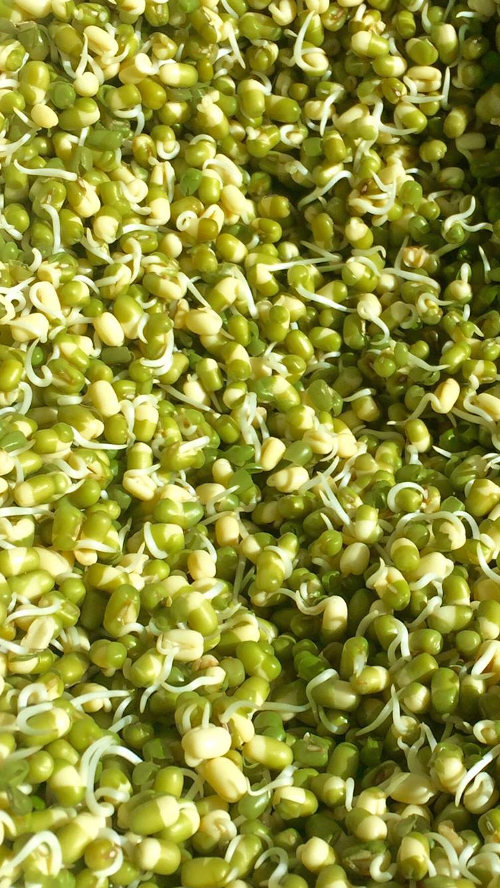
These take a little longer to grow but have higher protein levels than some.
Rice: Feeding rice to chickens is rare in the UK and the EU as we don't grow much of it but in parts of the world where it is a staple, rice is readily available and can be fed to chickens either as a grain or sprouted. I had quit a lot of problems finding whole grain rice to sprout but it can be found.
Feeding large quantities of rice can result in pale egg yolks, almost to the point of being completely white. Rice and rice sprouts are fine for chickens up to a maximum of 10% of the diet.
I found rice needed warm temperatures and was sluggish to sprout making it a poor choice. There is an association with a toxin producing bacteria called Bacillus Cereus which rules this grain out for sprouting for most keepers.
Millet: Millet is a small grain varying from almost white to a deep red depending on the variety and growing location. Millet is a group of small seeded grasses which are widely grown around the world as cereal crops or grains for fodder and human food.
Millet is a grain most backyard keepers could grow in their chickens runs to help feed their birds as the seed heads are easily harvested and dried. Millet sprouts easily and the chickens seem to like it. It does require warmer conditions initially to get it growing but once started the millet sprouts are ready in 4 days.
Millet also contains a wider range of amino acids than most other cereal crops making it a good choice.
Quinoa and Amaranth: Amaranth species are cultivated as leafy vegetables, pseudo-cereals, and ornamental plants and I believe they are currently banned in the US. Some members of the genus are known to produce a carcinogen so I didn't test these as sprouts on my chickens and recommend you don't either.
Quinoa is a flowering plant in the amaranth family, a herbaceous annual plant grown primarily for its edible seeds which are rich in protein, dietary fibre, B vitamins and minerals in amounts greater than in many other grains.
I was unable to find any that would sprout in an quantity so Quinoa was not tested as sprouts on my chickens. Quinoa sprouts are edible and good for chickens as they have a wide range of amino acids.
Hemp: Hemp is not available everywhere and is banned from production in some countries. Hemp seed sold in some stores has been treated to prevent it from sprouting. I bought a 25Kg sack for testing and it sprouted fine. Technically you may need a licence to even sprout hemp seeds as cultivation is illegal in many parts of the world.
The hens like hemp sprouts and they are nearly 35% protein making them an excellent if expensive choice for chicken feed. Hemp sprouts are very rich in healthy fats, high-quality protein and several minerals.
What sprouts can chickens not eat?
Flax and Niger seed sprouts are a bad idea. This is not because they are not good for chickens but when soaked in water they turn into a horrible gooey slimy mess!
Below: This is what happens to flax when you soak them in water for sprouting.
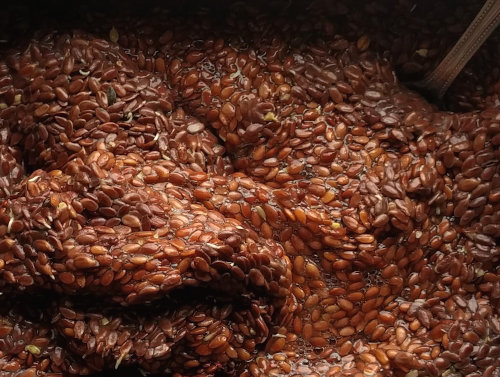
Mouldy, rotting or slimy sprouts should never be fed to chickens. Do not feed spoiled oats to the birds. It will make them sick.
Below: Mouldy grains should never be fed to chickens.
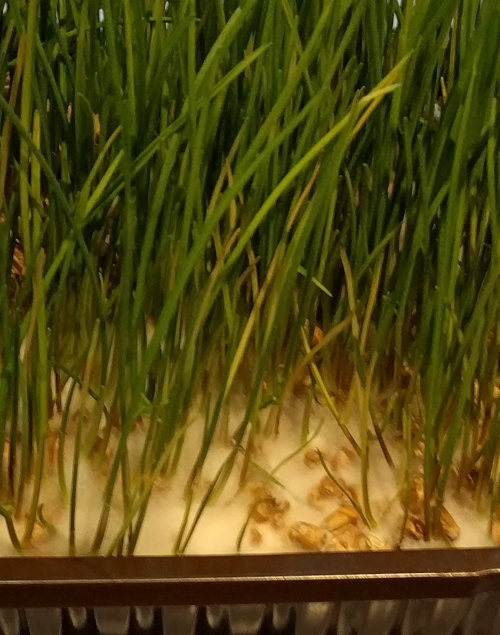
Sprouting oats have spoiled if they smell bad or feel "slimy" to the touch.
You know if sprouts have gone bad:
- They grow mould.
- They smell.
- They feel slimy.
How to sprout seeds for chickens:
Sprouting seeds for chickens requires soaking for 24 in clean water and then allowing the seeds to grow for a few days. For the small backyard flocks this is best done in small jars or trays to produce a handful or so at a time.
Step one: Fill each jar one quarter to one third full with grains.
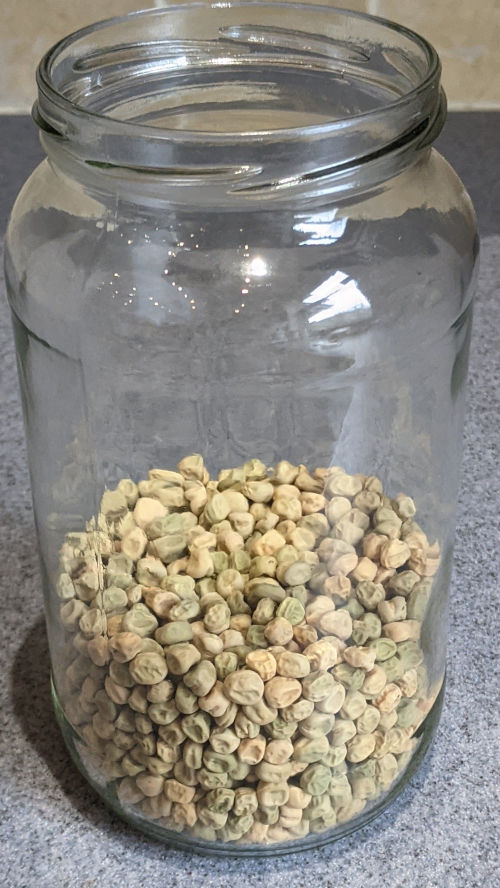
Step 2: Cover with plenty of water and soak for 24 hours.
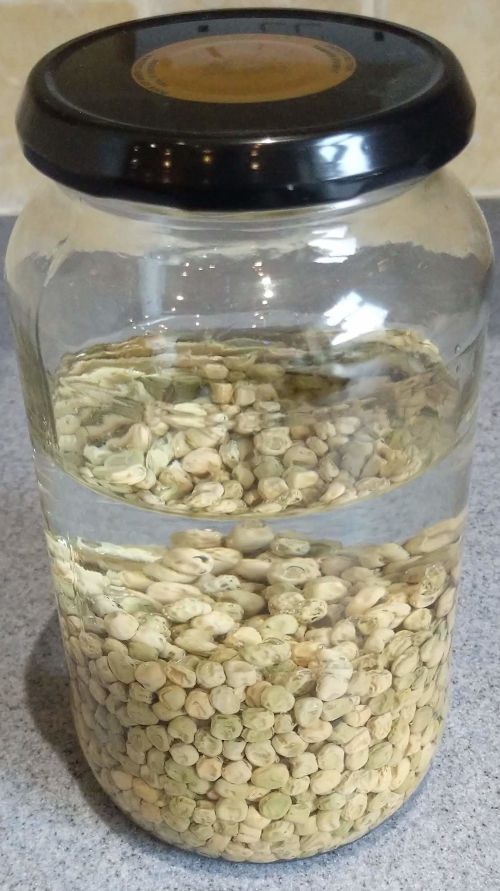
Step 3: Drain completely and cover the jar with cheesecloth, held inplace with an elastic band. Here are the soaked peas ready to sprout.
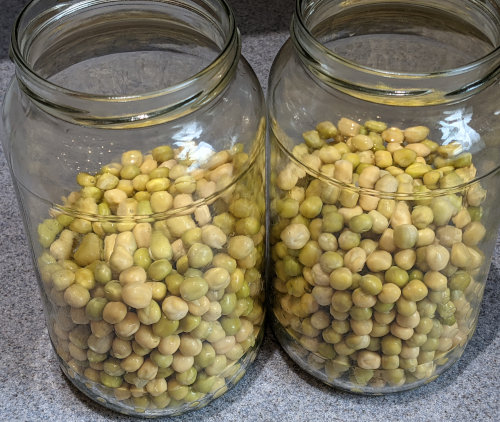
Step 4: Fill the jar twice a day with tepid water for 30 seconds and allow to drain completely. Once they have grown a root like this they are ready to feed to your flock.
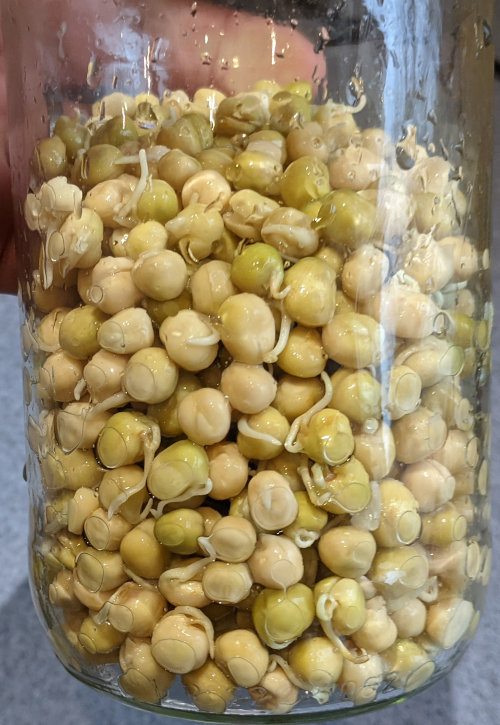
You want to keep the sprouts damp, not drown them. If you think they are a bit wet then leave the jar upside down to drain.
Step 5: Feed to your chickens.
Large amounts can be done in buckets.
Should you let sprouts green up before feeding?
Greening sprouts will need two or three days of light so as the leaves begin to colour as they grow.
Some sprouts, like canola or oil seed rape, green up very quickly. The sprouts will also bulk up considerably in the few days while they are greening up.
Below: Greened up grain sprouts.
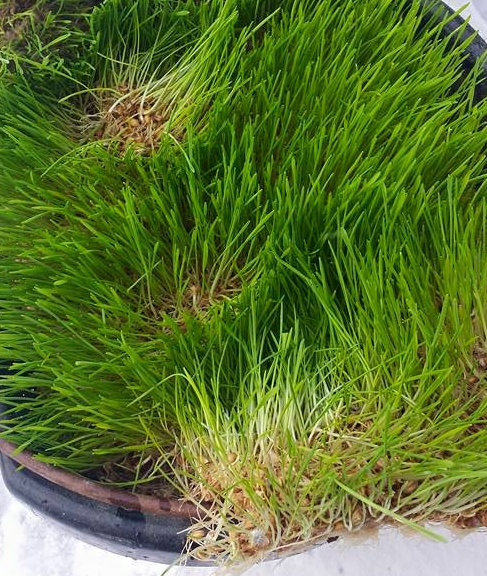
Buckwheat and sunflower sprouts should not be greened up for chickens as they are a member of the rhubarb family and the green leaves contain Oxalic acid.
How to feed sprouts to chickens:
Feed a heaped tablespoon of sprouted grains per bird, this is 15 grams. Any more and you may end up with nutrient deficiencies or digestive problems in your chickens.
Grain sprouts can be greened up to provide fresh pasture for chickens kept indoors or during winter.
Sprouted grains which are 1-3 days old are fed as scratch feed. On the 4th day, a nutritional change occurs inside the sprouts and the sprouts become "green food".
Feed as a supplement to regular ration.
Can you feed chickens just sprouts?
Chicken need more variety and nutrients in their diet than they can get from just sprouts. when feeding sprouts to your chickens you see them as a treat and not give more than 10% of the diet as sprouted grains.
Can baby chicks eat sprouted grains?
Sprouted grains is an excellent way of introducing foods into the diet of young chickens. No more than one or two per chick to start with.
